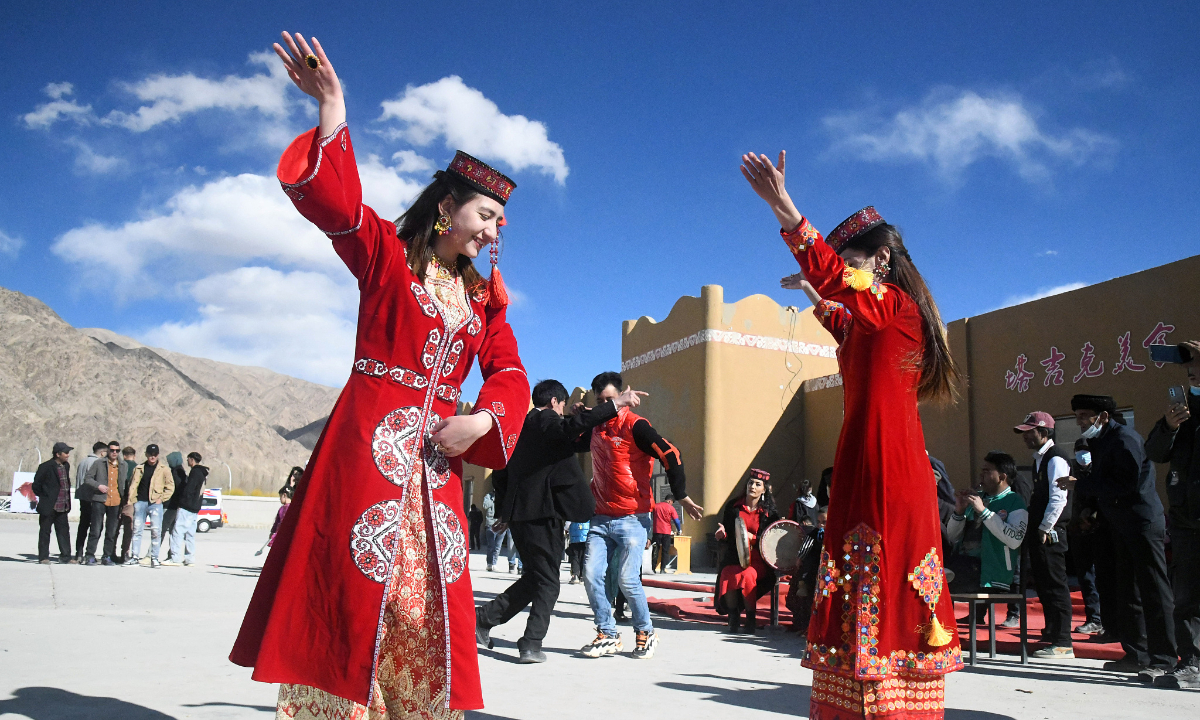China opposes US’ blacklisting three more Chinese companies over ‘forced labor’ accusation
US’ ‘Uygur bill’ does not concern human rights, but to contain China; will shoot itself in the foot: analysts

Performers dance at the ancient city of Kashgar scenic area in Kashgar, northwest China's Xinjiang Uygur Autonomous Region, Sept. 7, 2023. (Xinhua/Lan Hongguang)
The purpose of the US banning imports from Northwest China's Xinjiang Uygur Autonomous Region is never to protect the human rights of ethnic groups but to suffocate the development of the Xinjiang region and contain China, analysts said. They criticized the latest move by the US of adding three more companies to its entity list under the excuse of "forced labor" is only "shooting itself in the foot," and said it will additionally pose a negative impact on global supply chains and American companies.
The US Department of Homeland Security said in a statement that it added three Chinese companies - Xinjiang Tianmian Foundation Textile Co Ltd, Xinjiang Tianshan Wool Textile Co. Ltd, and Xinjiang Zhongtai Group Co. Ltd - to the Uyghur Forced Labor Prevention Act (UFLPA) Entity List for their business practices involving "persecuted" minorities in Xinjiang, bringing the total number of entities on the list to 27, Reuters reported.
Chinese Foreign Ministry spokesperson Wang Wenbin said on Wednesday that China has made clear time and again that the allegation of "forced labor" in Xinjiang is nothing but an enormous lie propagated by people against China to smear our country's image.
"It is the very opposite of the fact that the rights and interests of people of all ethnic backgrounds in Xinjiang are effectively protected," he said.
The US uses that lie as a basis to enforce the so-called "Uyghur Forced Labor Prevention Act", blacklist Chinese entities and go after more Chinese companies. The move is actually aimed at undermining Xinjiang's prosperity and stability and containing China's development. The move also tears at international trade rules and market order, Wang said.
Wang emphasized that China urges the US to immediately stop smearing China and stop meddling in China's internal affairs under the pretext of human rights. We will continue to resolutely safeguard Chinese companies' legitimate and lawful rights and interests.

Photo:VCG
The UFLPA, which took effect in June 2022, banned all products from China's Xinjiang region citing concerns of so-called "forced labor." It has been described as an evil bill since the day it was introduced as it forced companies to undergo self-review to pull anything related to China's Xinjiang region out of their supply chains.
For the past years, the US has intensified efforts to block products related to tomatoes, cotton textile industries and the photovoltaic (PV) industry from Xinjiang region with the purpose to forcibly eliminate the region from the global supply chain, Jia Chunyang, an expert at the China Institutes of Contemporary International Relations, told the Global Times on Wednesday. However, Jia said, these efforts have failed.
The US move to add three more companies in the Xinjiang region signals it is imposing wider and harsher sanctions on more companies to comprehensively beleaguer the region, strangling its economic development and sabotaging its social stability, Jia said.
On Tuesday, the US State Department also updated its Xinjiang Supply Chain Business Advisory, which accused China of "genocide and crimes against humanity" and "forced labor" in the Xinjiang region.
The US' unilateral sanctions on Chinese companies, which are based on groundless accusations, have not only affected the stability of global supply chains but also serve to "shoot itself in the foot," said Jia.
For example, the US' ban on the imports of solar panel raw material - polysilicon - from China's Xinjiang region would put Biden's climate change goals in danger. Moreover, Germany's biggest utility has reportedly warned that the US' UFLPA "significantly hinders plans to build a green energy infrastructure," media reported.
It has been the US' strategic target to rip the Xinjiang region from the global supply chain to suppress China's development, which means the US will not give up any opportunity to hype human rights topics in Xinjiang and other regions to stigmatize China's image, Chang Jian, director of the Research Center for Human Rights at the Tianjin-based Nankai University, told the Global Times.
Chang warned that China should keep alert to the US' long-term tactics of using human rights to attack China, and that Chinese companies should make preparations in case the US imposes unilateral sanctions.
Despite the anti-China forces' intensified smearing of China, analysts noted that more people in the international community are speaking out the voice of justice, and with more foreign diplomats, scholars, and religious groups coming to visit Xinjiang and seeing its development with their own eyes, the lies made by anti-China politicians and forces in the US are collapsing, analysts said.
For example, a delegation of diplomats from 24 countries visited Xinjiang in early August, during which they saw modern technologies widely used in cotton fields, visited mosques, and talked to locals in scenic spots and residential communities. Many diplomats noted that some Western media's reports on the Xinjiang region are fake, and the truth of the region must be told to the outside world, media reported.


